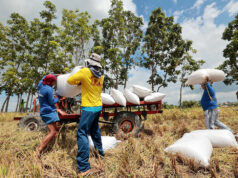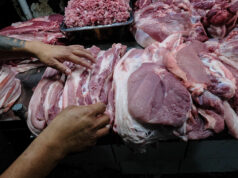DAVAO CITY — Maharlika Agro-Marine Venture Corp. said it has lost its Japanese clients for Peking duck to competition from Thailand, and is struggling to venture into new export markets due to the absence of government-to-government agreements.
“The prospects for Peking duck are not so nice now. Our volume is not so big and we can’t compete against Thailand because their volume is huge,” Maharlika Chairman and Chief Executive Officer Vicente T. Lao said in an interview.
The company started exporting Peking duck products to Japan in 2013 through contracts with Japanese firms Daigo Tsusho Co., Ltd. and Aono Fresh Meat Co. Ltd. These deals that covered up to 28 metric tons (MT) monthly, however, have recently been terminated as the buyers shifted to Thai suppliers.
“We can’t compete with Thailand and China because they have the volume,” Mr. Lao said. “Thailand also has advantage because they can ship their by-products to China through the backdoor and since the by-products like gizzard are three times more expensive, especially during Christmas, they can transfer the cost to these by-products so they can sell their main products at a cheaper price,” he added.
Aside from lower production volume compared with foreign competitors, Mr. Lao said the company is facing difficulties developing other markets because of “protocol problems” arising from the absence of agreements between the Philippines and potential export destinations.
“Protocols mean two countries have an agreement that if one certifies that the meat product is okay, then the other country will accept it if I send the product, and vice versa,” he explained.
The Philippines and Japan, for example, have the Japan-Philippines Economic Partnership Agreement (JPEPA), under which the firm was able to export the duck products to Japan.
Mr. Lao said he has written to the Department of Agriculture (DA) several times to seek help on this, but there has been no response.
“Like I need to talk to an investor in South Korea, but government has not established protocols,” he said.
Maharlika’s prospects for the Middle East, meanwhile, have been put on hold due to Halal certification issues.
In the meantime, Mr. Lao said the local market remains robust, especially with the DA’s importation ban on all poultry products — including dressed and deboned chicken, duck and eggs — following bird flu cases in Europe and Asia.
Maharlika, established in 2006, supplies Philippine buyers with up to 40 MT of Peking duck meat per month, including frozen whole duck and premium cuts, among other products.
The company sources 3,000 duck breeders every three months from Cherry Valley Farms, Ltd. in the United Kingdom. It breeds the ducks in its farms in Manolo Fortich, Bukidnon and in Arakan Valley at the boundary of Davao City and North Cotabato. The ducks are then processed in facilities in Cagayan de Oro and Davao City.
Mr. Lao said he remains optimistic about the business and believes that if given government support, the Peking duck sector has a lot of potential for export growth considering that the Philippines has maintained its standing as a bird flu-free country and the climate is conducive to breeding. — Carmencita A. Carillo
Lower production volume compared with foreign competitors and absence of agreements between the Philippines and potential export destinations are becoming problems of duck product exporters like Maharlika Agro-Marine Venture Corp. — WWW.MAHARLIKA.COM.PH



